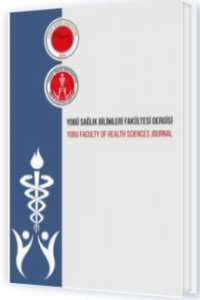INVESTIGATION OF THE KNOWLEDGES AND OPINIONS OF FACULTY OF HEALTH SCIENCES FINAL YEAR STUDENTS ABOUT FORENSIC NURSING AND MIDWIFERY
Öz
Aim: This study was conducted to determine the knowledge and opinions of senior students studying at the nursing and midwifery department of Kafkas University about forensic nursing and midwifery.
Material and Methods: The sample of the research, which was conducted in descriptive-cross-sectional type and in which face-to-face survey method was applied, consisted of 200 students. Data were evaluated using number and percentage calculations and chi-square significance test. Statistical significance level was accepted as p <0.05.
Results: In the study, the mean age of the participants was 22.75±1.14 and it was determined that 89% of them had not experienced a forensic medical event. Of the participants, 48% stated that they had knowledge about forensic nursing/midwifery and 32.5% did not learn the roles and responsibilities of the forensic nurse/midwife. There was a statistically significant difference between the status of being educated about forensic nursing/midwifery and wanting to work, and the status of wanting the departments (p<0.05). In addition, the difference between willingness to work in forensic nursing/midwifery and gender groups was statistically significant (p<0.05).
Conclusion: The students stated that forensic nursing/midwifery course should be given, they did not have knowledge about forensic nursing/midwifery and it should be included as a separate discipline. In order to have enough knowledge about forensic nursing/midwifery, it is necessary to provide training by experts in the form of lectures, presentations or congresses.
Kaynakça
- 1. Machado BP, Batista de Araújo IM, Figueiredo MDCB. Forensic nursing practice - What do the students know anyway? Forensic Science İnternational Synergy 2020; 2: 138–143. https://doi.org/10.1016/j.fsisyn.2020.04.00 3 2. Tygai I, Grover N. Development of forensic science and criminal prosecutionIndıa. Int J Scı Res Publ 2014; 4 (12): 1-7. ISSN: 2250-3153. 3. Covington D. Year of the forensic nurse and midwife. Journal of Forensic Nursing 2020; 16(1): E1–E2. https://doi.org/10.1097/JFN.000000000000 0279
SAĞLIK BİLİMLERİ FAKÜLTESİ SON SINIF ÖĞRENCİLERİNİN ADLİ HEMŞİRELİK VE EBELİK HAKKINDAKİ BİLGİ VE GÖRÜŞLERİNİN İNCELENMESİ
Öz
Amaç: Kafkas Üniversitesi’nde hemşirelik ve ebelik bölümünde okuyan son sınıf öğrencilerin adli hemşirelik ile ebelik hakkında sahip oldukları bilgi ve görüşlerinin belirlenmesi amacıyla yapılmıştır.
Gereç ve Yöntem: Tanımlayıcı-kesitsel türde yapılan ve yüzyüze anket yöntemi uygulanan araştırmanın örneklemini 200 öğrenci oluşturmuştur. Sayı ile yüzdelik hesaplamaları ve ki-kare önemlilik testi kullanılarak veriler değerlendirilmiştir. İstatistiksel anlamlılık düzeyi p <0.05 olarak kabul edilmiştir.
Bulgular: Araştırmada katılımcıların yaş ortalaması 22.75±1.14 olup ve %89’unun adli tıbbi olay yaşamadığı belirlenmiştir. Katılımcıların, %48’i adli hemşirelik/ebelik hakkında bilgisi olduğunu ve adli hemşirenin/ebenin rol ile sorumluluklarını %32.5’i öğrenmediğini belirtmiştir. Adli hemşirelik/ebelik hakkında eğitim verilme ve çalışmayı isteme durumu ile bölümler arasındaki fark istatistiksel olarak anlamlı saptanmıştır (p<0.05). Ayrıca adli hemşirelikte/ebelikte çalışmayı isteme durumu ile cinsiyet grupları arasında fark istatistiksel olarak anlamlı bulunmuştur (p<0.05).
Sonuç: Öğrenciler adli hemşirelik/ebelik dersi verilmesi gerektiğini, adli hemşirelik/ebelik hakkında bilgi sahibi olmadıklarını ve ayrı disiplin olarak yer alması gerektiğini belirtmiştir. Adli hemşirelik/ebelik hakkında yeterince bilgiye sahip olunması için uzman olan kişiler tarafından ders, sunum ya da kongre şeklinde düzenlenerek eğitim verilmesi önerilmektedir.
Anahtar Kelimeler
Kaynakça
- 1. Machado BP, Batista de Araújo IM, Figueiredo MDCB. Forensic nursing practice - What do the students know anyway? Forensic Science İnternational Synergy 2020; 2: 138–143. https://doi.org/10.1016/j.fsisyn.2020.04.00 3 2. Tygai I, Grover N. Development of forensic science and criminal prosecutionIndıa. Int J Scı Res Publ 2014; 4 (12): 1-7. ISSN: 2250-3153. 3. Covington D. Year of the forensic nurse and midwife. Journal of Forensic Nursing 2020; 16(1): E1–E2. https://doi.org/10.1097/JFN.000000000000 0279
Ayrıntılar
| Birincil Dil | İngilizce |
|---|---|
| Konular | Ebelik (Diğer), Doğum ve Kadın Hastalıkları Hemşireliği, Hemşirelik (Diğer) |
| Bölüm | Araştırma Makaleleri |
| Yazarlar | |
| Yayımlanma Tarihi | 23 Ağustos 2024 |
| Yayımlandığı Sayı | Yıl 2024 Cilt: 5 Sayı: 2 |

